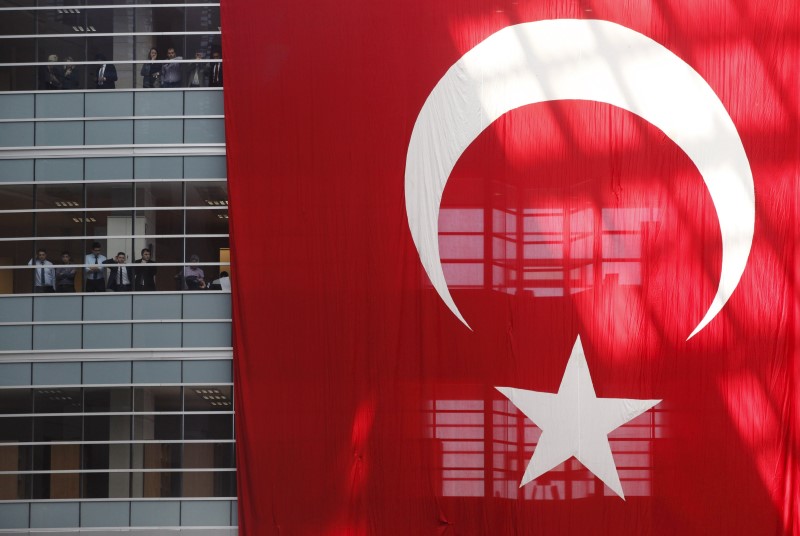(Bloomberg) -- It was just around 6 a.m. on Saturday when Murat Uysal put out his first statement as Turkey’s new central bank governor.
His pledge to “independently implement monetary policy instruments” for the sake of price stability may seem standard, but practicing what he preaches will be a test for Uysal, who took office after President Recep Tayyip Erdogan’s stunning dismissal of Murat Cetinkaya.
A deputy governor since 2016, Uysal faces one of the toughest acts the world of central banking has to offer. Cut interest rates too little and risk Erdogan’s fury; cut too much and watch markets suffer. The sudden clearing of the decks blindsided some investors and has already put Turkish assets under pressure.
In ordinary times, Uysal would pass for a reasonable candidate to take charge of monetary policy in the Middle East’s largest economy with a debt market bigger than Russia’s.
Armed with degrees in economics and banking and a fluent speaker of three languages, the 47-year-old boasts years of experience as an executive at one of Turkey’s top lenders.
Dovish Leanings
What qualified him to take over from Cetinkaya, however, may have little to do with his resume. A person who’s worked with Uysal said he was close to the president and described him as sincere and easy to work with. As a member of the Monetary Policy Committee, he’s staked out views that are more dovish and focused on credit growth than some other rate-setters, said the person, who requested anonymity to speak candidly.
If so, Uysal’s stance would align him closer to Erdogan, who’s signaled he’s running out of patience with a central bank that’s held interest rates since a dramatic increase of 625 basis points last September. As inflation slows and the economy still runs the risk of a double-dip recession, Uysal will get his first chance to relax policy at a meeting less than three weeks from now.
“With his experience as deputy governor and before then as head of treasury of a large bank, there’s no question the new governor is well prepared,” said Inan Demir, an economist at Nomura International in London. “However, the ease with which the former governor was removed sets a dangerous precedent, which is bound to have an impact on monetary policy conduct going forward.”
‘Window to the West’
A graduate of a prestigious Istanbul high school famously known as “Turkey’s window to the West,” Uysal’s background in finance sets him apart form Cetinkaya, whose academic focus was on sociology and international relations. A thesis he wrote on inflation-targeting was criticized for alleged plagiarism on Monday, with the central bank declining to comment on the accusations.
Uysal’s thesis adviser later oversaw the dissertation of Berat Albayrak, Erdogan’s son-in-law and currently the treasury and finance minister.
Working as a deputy chief executive officer at state-run Halkbank, Uysal had an up-close view of a corruption probe that briefly engulfed the lender and implicated cabinet ministers and their families.
Uysal remained an “honest, hardworking and sincere guy” throughout the difficult times, said Isik Okte, a TEB strategist who worked with him while serving as a research director at Halkbank’s brokerage subsidiary.
“He understands financial markets well, he is open to communication with everybody and when he doesn’t know something he says so and makes an effort to learn,” he said. “These qualities may not necessarily make him a great central banker, but they surely make him a great manager -- one of the best I have seen in my 25-year career in the finance sector.”
Boxed in by nervous markets and an impatient Erdogan, Uysal’s room for error is minimal. So far he’s vowed that the central bank will focus “on achieving and maintaining its primary objective of price stability.”
Toeing the Line
The question is whether Erdogan is on board. During a closed meeting hours after ousting Cetinkaya, Erdogan told lawmakers from his ruling party that politicians and bureaucrats all need to get behind his conviction that higher interest rates cause inflation, according to an official who was present. He also threatened consequences for anyone who defies the government’s economic policies, the official said.
Erdogan, who once called himself an “enemy of interest rates,” has long said that he intended to tighten his grip on the economy and take more responsibility for monetary policy. To dismiss Cetinkaya, he used the powers granted to his office after last year’s general election, which transformed the political system into an executive presidency.
If that’s the case, Uysal may be little more than a figurehead.
“With the sacking of Cetinkaya, President Erdogan has made clear that he has the last say in terms of monetary policy,” said Ulrich Leuchtmann, head of currency and commodity research at Commerzbank AG (DE:CBKG). “In this situation, even the most hawkish central banker of the world would have to bend -- as the alternative would be to be sacked himself.”
